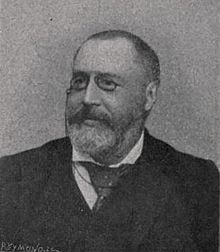Edmond Tarbé des Sablons
| Edmond-Joseph-Louis Tarbé des Sablons' | |
|---|---|
 |
|
| Born |
20 February 1838 Paris, France |
| Died | 14 December 1900 (aged 62) Paris, France |
| Nationality | French |
| Occupation | Journalist, author |
Edmond-Joseph-Louis Tarbé des Sablons (20 February 1838 – 14 December 1900) was a French journalist and man of letters.
Edmond-Joseph-Louis Tarbé des Sablons was born in Paris on 20 February 1838. He came from one of the many branches of the family of Louis Hardouin Tarbé, Minister of Finance from 1791 to 1792. He was grandson of Sébastien-André Tarbé des Sablons, known for publishing the first classical book on weights and measures, who was authorized to add "des Sablons" to his surname of "Tarbé" by a decree of 1817. He was one of two sons of Mme Tarbé des Sablons, who gained some reputation for composing several operas.
Tarbé des Sablons wrote musical criticisms under the pseudonym "Zanony" in l’Époque, published by Georges Feydeau. He collaborated with his brother Eugène in articles for various journals, either under his own name or using various pseudonyms. They wrote joint articles of musical criticism for Le Figaro when it became a daily newspaper. He also published several novels under pseudonyms such as "Baronne d’Ange". Tarbé was mayor of Eaubonne from 1865 to 1871.
On 5 July 1868 Tarbé and Henry de Pène founded the daily Le Gaulois, and the next year he became the sole director. He held this position until July 1879, when he handed over to Arthur Meyer so he could devote himself to literature. He wrote a series of "political impressions" for this newspaper which gained much attention.
Tarbé published a number of books under the name "Jacques Lefèvre" including Les Drames parisiens (1875), Barbe grise (1884), Bernard l’assassin (1884), Monsieur de Morat (1886), le Roman d’un crime (1887), Césarée (1890), le Crime d’Auteuil (1892) and l’Histoire d’Angèle Valois (1892). He created two dramas. Monsieur de Morat (1887), taken from his novel théâtre du Vaudeville, was based on Charles de Morny, the minister of the Empire. The previous year his drama in five acts Martyr (1886), in collaboration with Adolphe d'Ennery, had a great success at the Théâtre de l'Ambigu.
...
Wikipedia
